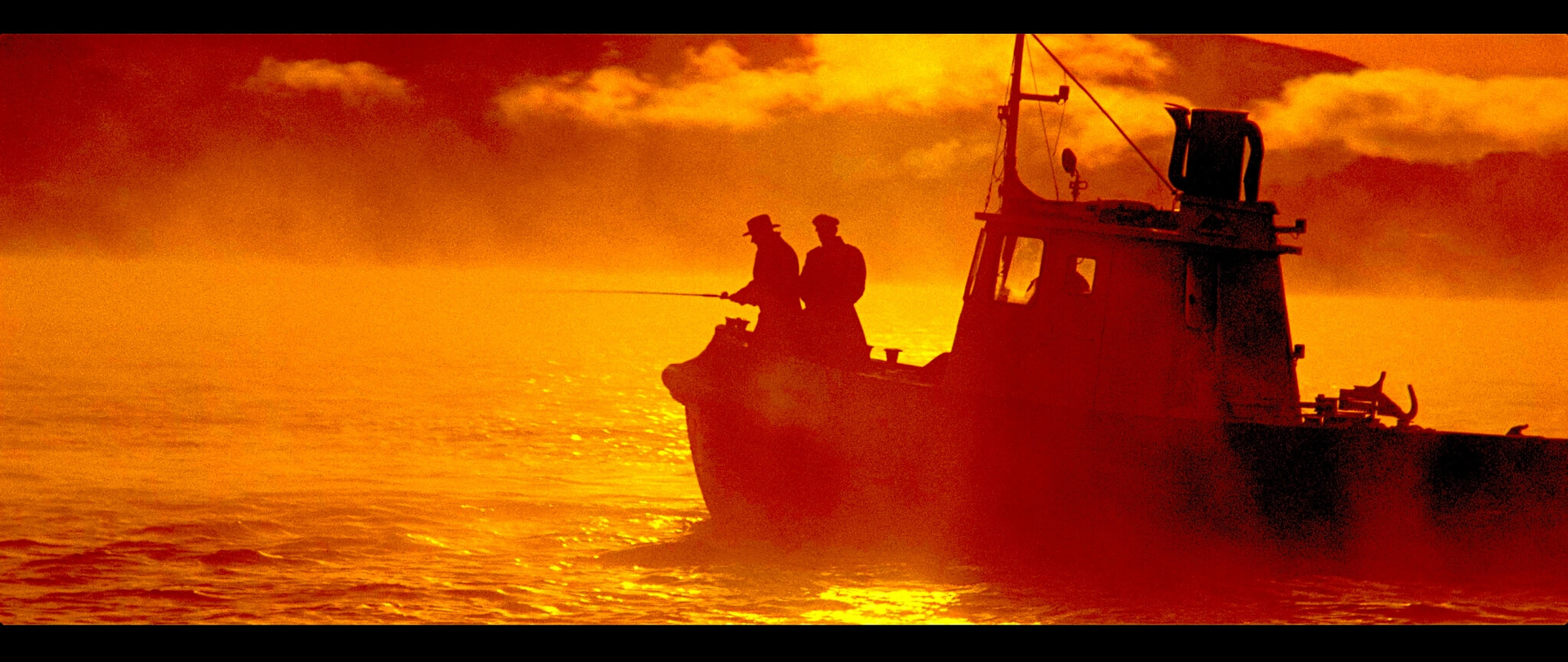A languid and arresting WWII movie — and then it goes haywire
Redolent of Antonioni and Bergman, Rob Tregenza’s ‘The Fishing Place’ offers moments of beauty and incomprehensibility

Rob Tregenza’s ‘The Fishing Place is set in a remote seaside village in Norway. Photo by Cinema Parallel
A relentlessly slow and at times incomprehensible film, Rob Tregenza’s The Fishing Place recounts a potentially interesting World War II story about potentially complex characters played by potentially compelling actors. If only the director’s vision, which never lets you forget its presence, hadn’t gotten in the way.
Housekeeper Anna (Ellen Dorrit Petersen), alone on a small fishing boat, travels to a remote seaside village in Norway where she becomes a member of an extended household staff in an elegant home. She’s setting the table for a dinner party that includes an SS officer (Frode Winther), a good friend of her boss. Previously Anna was a Nazi prisoner, though we never find out what she was charged with. Still, she is being given a second chance to redeem herself by spying on a local priest (Andreas Lust), whom the Nazis suspect may no longer be a loyal follower. Anna’s job is to report on his activities. She has empathy for the priest and she is trapped on many fronts. There’s her past relationship with the SS officer, a relationship that remains amorphous. Either way, he is now making unwanted sexual advances that she feels obliged to tolerate.
Other characters in moral turmoil are her boss’ wife, a dying actress, confined to a wheelchair, who is compelled to tell her husband that their son, a young man with whom he has an estranged relationship, is not his biological child. She can no longer justify keeping the secret and asks the priest for advice. He himself is sickly and experiencing a crisis of faith. Much of the minimalist film consists of static interactions between the characters who are in various stages of psychic and or physical decline. The film provides little backstory.
That said, a portrait of a totalitarian world is hinted at throughout. One enigmatic scene features the priest and SS officer fishing together like old buddies, equally ensnared and mutually bound. The title, The Fishing Place, is multi-layered and suggestive. Here they’re fishing for information, fishing for survival, and fishing is an act of cruel baiting and murder.
Despite the spare dialogue, the pregnant silences, and the many, many sweeping long takes of bleak, barren, and despairing landscapes, the film carries you along for a short while. A sense of impending doom is everywhere.
Best known for his previous film, Gavagai, dealing with loss, grief and closure of sorts, Tregenza has cited Jean-Luc Godard as an artistic influence. Godard chose Tregenza’s earlier film, Talking to Strangers to be shown at the Toronto International Film Festival in 1996 and was an uncredited collaborator on the film Inside/Out.
More than Godard, The Fishing Place brings to mind Ingmar Bergman and Michelangelo Antonioni. Its elliptical narrative has its moments, and some of the imagery is memorable. The problem is that they become substitutes for a script that doesn’t know where to go or how to get there.
Far more serious, a third of the way through, the film abruptly changes genre. Despite its heavy atmospheric elements, up until that point it has lived within the parameters of realism.
But then, without warning, we’re thrust into other aesthetic spaces: identities become blurred and in one nightmarish sequence, which could be a dream, memory or fleeting image, Anna witnesses two workers dumping the body of the now-dead priest onto the banks of a small pond. She drags his corpse into the pond and the submerged duo is swept up into a dark maelstrom of water that exists in some kind of netherworld spinning round and round in circles.
In the final 20 minutes, the film goes haywire — without any segue, the fourth wall has been shattered and the actors, now out of character, play themselves on location as the crew busies itself for the next shot, a re-shoot of the first scene.
Anna, or should we call her Ellen, is no longer on a boat, but rather a floating dolly operated by a pulley system, All movie magic pretense has been stripped away. One assumes that some self-referential comment is being made about the film making process in addition to a larger commentary on the meaning of the whole movie and perhaps, dare I say it, life.
Is Tregenza asserting it’s all fake anyway? We’re all nothing but actors performing our roles? Who knows?
I wish I could ask “And who cares?” But I do. The film had much to offer and then didn’t.
The Fishing Place screens at MoMA through Feb. 12. It will play at Laemmle Theaters in Los Angeles, March 7, followed by a national rollout.















